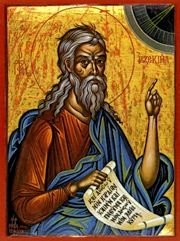bite-size wisdom (the gift of triumphing over ourselves)

I was just watching Roberto Rossellini's 1950 film "The Flowers of St. Francis." This film has a simple beauty. ... a simplicity that I think St. Francis would approve of. Apparently, Roberto Rossellini was an avowed atheist (according to one review on Netflix), but his family (including daughter actress Isabella) were great friends to the friars and the town south of Naples where this film was shot. It truly was a stroke of genius that Roberto had real Franciscan friars--and not professional actors--portray Francis' band of friars. How could an actor portray the joy of the religious life that is so counfounding to the outside worlds? How could an actor portray the impression that this amazing saint had on his followers?
At any rate, I have a great quote from the movie. I am not sure if St. Francis actually said this, but it is a great line. St. Francis and another friar are talking about true happiness. Francis says that even if those men were used to convert all the infidels in the world, even if they fed all of the poor, etc. ... even then they would not have true happiness. They then stumble upon a house and they boldly begged for alms from the man who lived there ("come, serve Christ with us" they joyfully pleaded). The man verbally assaulted them ("thieves", "vagrants") and then chased them out of his home with a club, even beating them a little. Picking themselves up out of the mud, St. Francis said:
"Brother Leone, lamb of our good Lord, now that we've borne all this for the love of our blessed Christ, know that in tihs resides perfect happiness. Because, above all the gifts Christ bestows on his servants is that of triumphing over ourselves and bearing every evil deed and tribulation out of love for him. In this alone lies perfect happiness. [they then begin joyfully singing in Latin the Magnificat:] Magnificat anima mea dominum... ["My soul proclaims the greatness of the Lord,... (Lk 1:46-55)]
The lives of the saints are the Gospel incarnate. This of course reminiscent of the thankfulness of the apostles after they were flogged by the Sanhedrin court for preaching the Gospel of Christ: "So they left the presence of the Sanhedrin, rejoicing that they had been found worthy to suffer dishonor for the sake of the name. And all day long, both at the temple and in their homes, they did not stop teaching and proclaiming the Messiah, Jesus" (Acts 5:41-42).
Labels: bite-size wisdom, film, religious history, religious life, spirituality


<< Home